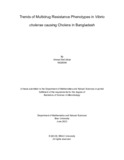Trends of multidrug resistance phenotypes in vibrio cholerae causing cholera in Bangladesh

View/
Date
2023-06Publisher
Brac UniversityAuthor
Afzal, Ahmed RafiMetadata
Show full item recordAbstract
Antibiotic resistance is a growing global concern, posing significant challenges in the treatment of bacterial infections. Vibrio cholerae, a gram-negative bacterium responsible for the severe diarrheal disease cholera, has exhibited multidrug resistance, limiting the effectiveness of available treatment options. This study aimed to investigate the antibiotic resistance profile of Vibrio cholerae strains which were collected from each month between January-September from the year 2022 including isolates associated with a small outbreak occurring in April, 2022. All the strains (n=30) used in this study were Vibrio cholerae serogroup O1 and El Tor biotype. The antimicrobial susceptibility tests confirmed that all the test isolated strains were sensitive to Fluoroquinolone, Cephalosporin and Macrolides classes of antibiotics. But alarmingly, there were resistance to Imipenem (IPM), Trimethoprim sulfamethoxazole (SXT), Ampicillin (AMP) and Amoxicillin-clavulanic acid (AMC) with 83% of the strains being multidrug resistant (MDR). The isolated Vibrio cholerae strains showed the most significant resistance to AMP and SXT. Antibiotic resistance trend was found to correlate to the prevalence pattern of serotypes, while 94% of the Ogawa serotype was resistant to IPM whereas only 64% of the Inaba strains were resistant to that. The findings from this study will contribute to better treatment strategies for cholera patients, considering the antibiotic resistance profile of Vibrio cholerae strains.
